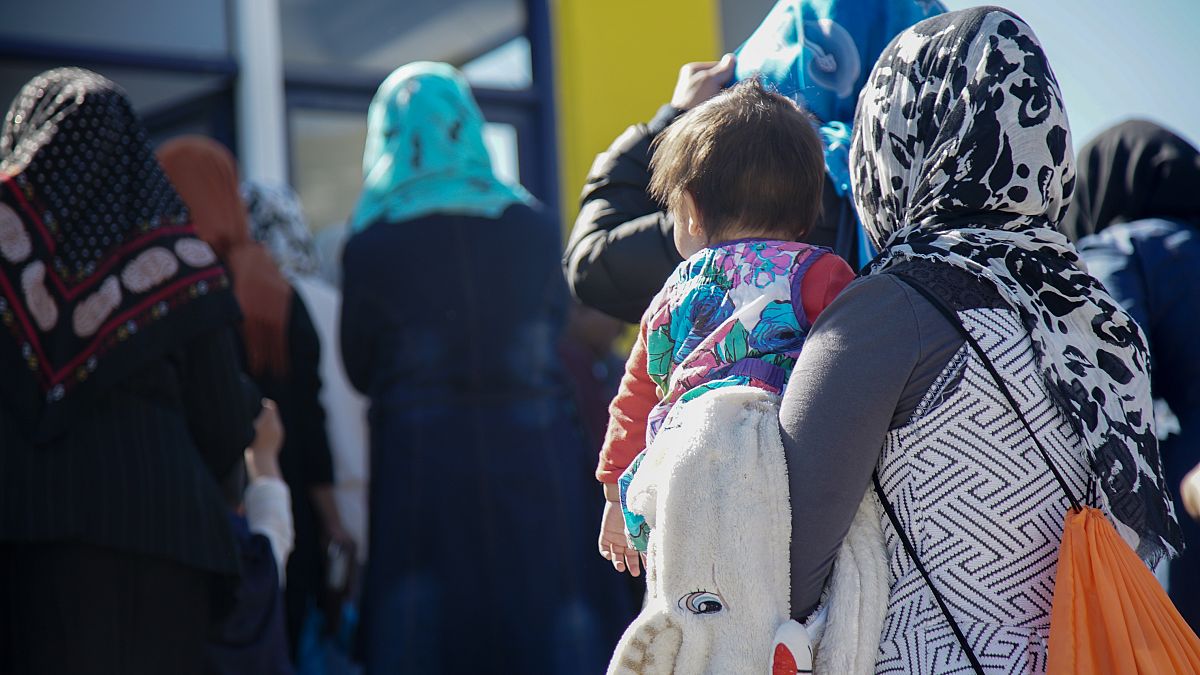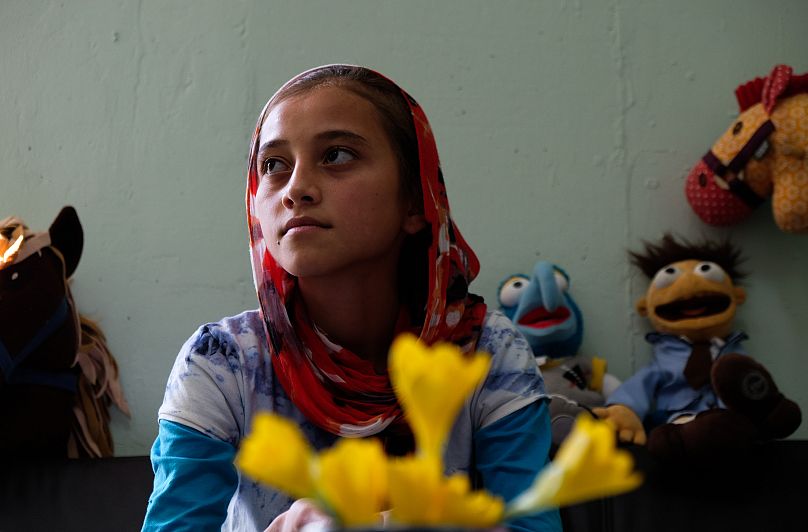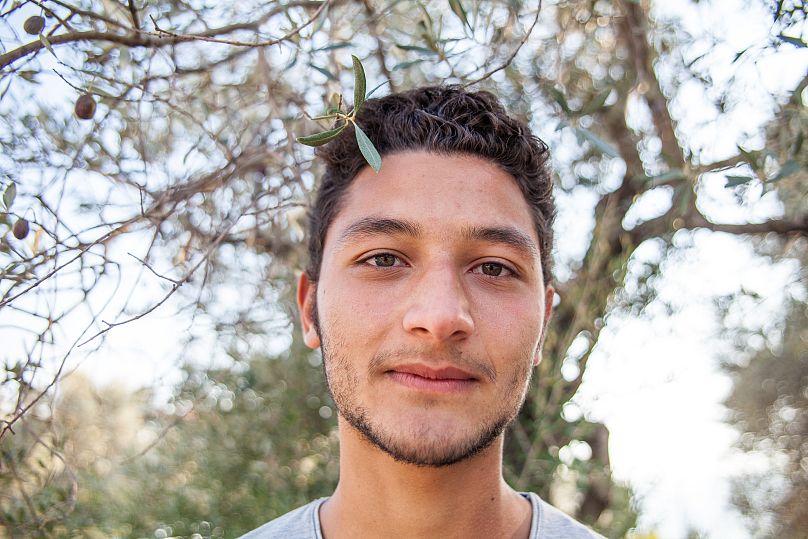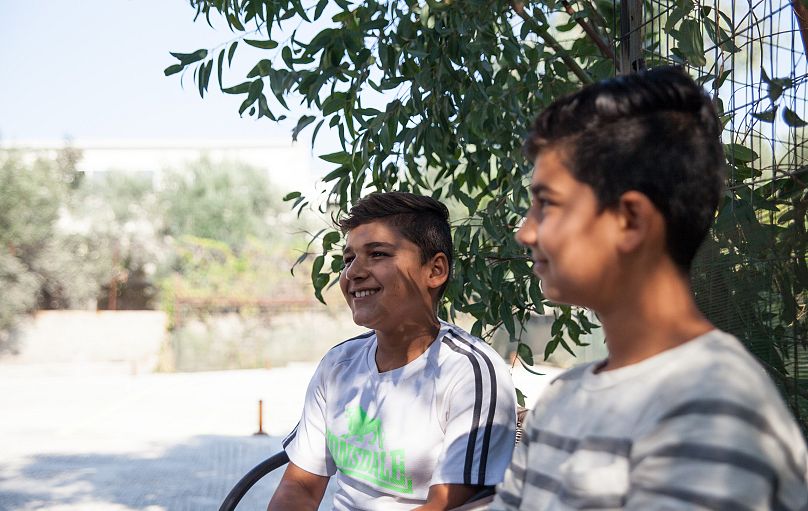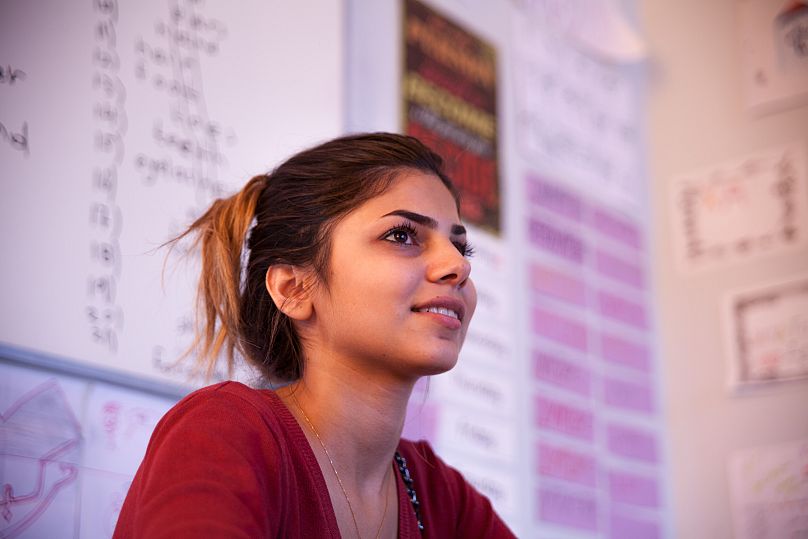Children and young people explain what it's like to grow up in an overcrowded refugee camp, and how access to a family support center gives them hope.
By UNICEF
So far this year, approximately 26,000 refugees and migrants have arrived on the Greek islands – approximately 37 percent of them are children.
These children and families have been forced to flee their homes due to conflict and poverty and risk everything in search of safety and opportunities for a better life.
But they are not finding such opportunities on the islands. Thousands of refugees and migrants, including children, are living in overcrowded, unsanitary and dangerous accommodation centers. Conditions are increasingly unbearable.
The Reception and Identification Center in Moria, on the island of Lesvos, is the largest such center. Its maximum capacity is 3,100 but now hosts more than 7,500 people, nearly one-third are children.
UNICEF, with local partners, runs a child and family support center in Moria called the TAPUAT Center, where the most vulnerable refugee and migrant children and women have daily access to essential services, including psychosocial support, and education classes.
Below – in their own words – are the stories told by children and young people who regularly attend the TAPUAT Center and live in Moria.
"'If you do not leave this place, we will kill your children,' they said." – Shona, 12 years old from Afghanistan
Why did you come to Greece and how did you get here?
Back in Afghanistan, some people were threatening my father. “If you do not leave this place, we will kill your children,” they said. We took the smuggling way.
We started our journey in Kabul, my city, and from Kabul we went to Turkey. We left Afghanistan to Pakistan, to Iran and Turkey. The crossing to Pakistan was good, but the crossings to Iran and Turkey were very difficult. It was wintertime, there was a lot of snow and it was very cold. I traveled with my family, my four siblings and my parents.
Can you explain what your life is like now?
Since two months, I live outside of Moria camp. We call it ‘the Jungle’ side, in the olive groves.
It is only our family. My parents and five children live in a tent. For us it is bearable, but for my younger brother, it is extremely hard because he is a newborn. Also, winter is coming and we know it is going to be very hard.
Sometimes I have good days, sometime I have bad days. During the day, we have a lot of appointments, like we go to the doctor, we have interviews, or other appointments for vaccinations.
My biggest problem is that I live in the Jungle.
What is the best thing about your life right now?
My family’s happiness is very important for me, and I like watching the sea.
Do you feel safer here than at home?
Yes
If you had the opportunity to represent the other children living in Moria, and to tell the world one thing about what happened to you, what would it be?
They should not leave children living in Moria. Children should have a better place to live.
Do you have a dream for the future?
I want to become a pediatrician.
"Moria is worse than war" – Yusuf, 17 years old from Aleppo, Syria
Why did you come to Greece and how did you get here?
Because of the war in my country. From Aleppo to Greece, we needed three months. We are a family of six. I travelled with my two parents, my two brothers, and my sister. My youngest brother is two and a half years old, and I have a twin brother. We crossed Syria to go to Turkey and then we went to Greece. It was scary. I arrived one month and 10 days ago.
Where do you live now?
I live inside Moria camp. I live inside a small tent with my family. It is very small and uncomfortable. I would describe it as very bad place to stay.
What is a normal day like for you now?
Every day, I spend all day in the line to get food.
I usually wake up very early in the morning to be in the food line at 3 a.m. for breakfast. I wait in line from 3 a.m. until 8 a.m. I have a small break and then from 9 a.m. to 1 p.m., I have to wait in the food line again to have something to eat for lunch.
Then, I go to school (the TAPUAT center) until 5 p.m. and right after school, I directly go back to the food line to wait for dinner.
What is the hardest thing about your life in Greece?
For me, the hardest thing are the conditions in Moria because they are very bad.
For me, Moria is very bad - it is the way to death. There are a lot of drugs and a lot of fights. The place is crowded with too many people and it is very dangerous.
What are your dreams?
Since I was a little kid, I wanted to be a doctor, especially a surgeon. I have a lot of determination. I will do my best to become a doctor.
If you had a wish for the future, what would it be?
I want to forget.
If you wanted to say one thing to the rest of world what would that be?
We came from a war zone. We thought we are coming to a nicer safer place, but instead we figured out that Moria is worse than war.
"Our mother tried to commit suicide three times" – Brothers Ramin, 12 years old, and Ali-Rezar, 11 years old, from Afghanistan
(Ramin quoted, unless otherwise indicated)
Why did you come to Greece?
I don’t remember anything from Afghanistan. I remember Iran because I was living there with my family. Our parents wanted us to have a good future, that is why we decided to travel. When we arrived here, we realised this is not what we thought it would be. The conditions in Moria were a real disillusion. These conditions give us no opportunity to progress or prosper. Moria is so bad.
How did you get to Greece?
We went through many countries. We left Afghanistan to go to Iran, then went to Turkey and finally we crossed to Greece on a boat. We travelled with our parents and our sister who is four years old. It was very bad. We were scared. We have been living in Greece for six months now.
What is the situation like where you live now?
Presently, we live in Moria camp. We live inside the camp, in a container that we are sharing with two other families. In total, we are 12 people in one Isobox (pre-fabricated container) including our sister and father. But they are nice people and we have made friends.
Wherever we go outside, my father needs to be with us because our mum left. He cannot really take care of us because our sister is very young and he struggles with taking care of her.
TAPUAT (the UNICEF center) is the only place he allows us to go to alone. Everywhere else, he wants us to be all together. We cannot go to the food line without him because it is very dangerous. Every day, there are fights. My mother attempted suicide three times in Moria camp before she decided to leave without us. Now we talk to her sometimes, but at least she is alive.
If you had the opportunity to send the world a message, what would it be?
I would like them to know what we are going though. Right now, beside all the problems we are already facing, we have to spend several months in very bad conditions. Our mother tried to commit suicide three times during her time in Moria. Someone needs to listen to and respond to this horrible situation. Who will take care of our little sister?
Where is your mother now?
She is in Germany.
Do you have a lawyer in Moria to assist you?
No, we don’t have access to a lawyer in Moria. There are not enough for everyone.
Tell us about the TAPUAT center.
Ramin: We have been coming to TAPUAT for three months. My favourite subject is English. Everybody is my friend at TAPUAT, but my best friend is Muhammad.
Ali-Rezar: My favourite subjects are English and computer with George. Sabour is my best friend. He also comes to TAPUAT.
Do you have any dreams and hopes for the future?
Ramin: I want to do music, but I prefer to study my lessons for now. I dream to be a psychiatrist.
Ali-Rezar: I want to study to be a cardiologist and I know I need to work hard.
If you have the opportunity to pass a message to the other children of the world what would it be?
To help the children in Moria.
"We did not expect to be treated like this here in Europe" – Rudyana, 20 years old, from Afrin, Syria
Why did you come to Greece and how did you get here?
I left in 2017. My journey started in Afrin, Syria, then we went to Turkey and then crossed to Greece on a boat. I travelled with my family, my two brothers, my sister and my parents. It was scary. No one would risk his life unless he had to. One of my brothers is married and he also travelled with his family. He is now in Athens with his two kids.
I arrived five months ago and I am living inside Moria ever since. I am currently living inside a container with my family. In total, we are six people.
What is life like in Moria?
Everybody who sees Moria for the first time is shocked. It is a big shock for every refugee. We did not expect to be treated like this here in Europe.
I don’t want to be with other people (in Moria), so I prefer to stay alone. However, I like to come to school because there is nothing to do inside Moria and I am safe here.
What is the hardest thing for you about living in Greece?
It is living inside Moria camp.
What is the best thing about living in Greece?
I can see a future for me here. Being here is like a door opening. I can hope for a better future.
Can you tell us about the TAPUAT center?
I started coming to TAPUAT two or three months ago, but I can’t come every day because there are a lot of papers and other things I need to do. I come as often as I can. It is totally different than Moria. The teachers are very nice. I really feel I am making progress, I am improving.
Everybody here is very kind. They respect me. I love learning English, it is very important to me because I want to help other refugees by becoming an interpreter. I would like to help as a volunteer or a humanitarian worker.
Do you have a dream for the future?
Yes, I want to continue my studies, go to university and become a journalist.
If you could share a message with the rest of the world, what would it be?
We had to come here. We want a chance to live in a dignified manner. Moria is not safe, it is a very small place, overcrowded and dangerous. We have the right to live in a more dignified way with better conditions.
UNICEF is advocating for all vulnerable refugees and migrants, including children, on the Greek islands to be immediately transferred to the mainland and to appropriate accommodation facilities. This is essential, so that all refugees and migrants – especially children – can access adequate protection from violence and abuse, as well as essential health and education services.
Reception capacity on the mainland in Greece, specifically to accommodate unaccompanied children, needs to increase. UNICEF is currently working with humanitarian partners and authorities to increase the number of suitable accommodation facilities for children.
An increase in resettlement pledges from other EU Member States, prioritising children and improved family reunification procedures, are urgently needed.
Interviews were conducted by Elena Moustaka, Manager at UNICEF's child and family support hub, TAPUAT - a project implemented by UNICEF partner Better Days in Lesvos, Greece.
Opinions expressed in View articles are solely those of the authors.
